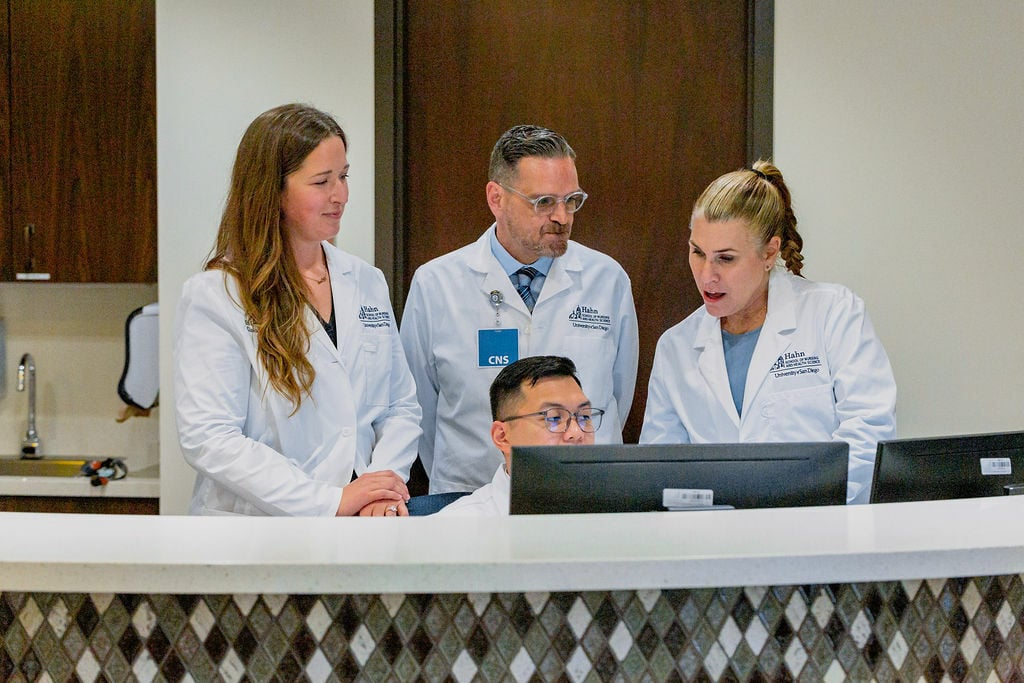
Discover the Benefits of a Nursing Degree From USD
The information in this blog post is for informational purposes only and is not intended to replace medical, financial, or professional advice.
Changes in healthcare delivery are occurring rapidly, requiring nurses to adapt to new systems and processes. To help nurses navigate and implement change, hospitals and clinics often rely on the expertise of clinical nurse specialists (CNSs).
The primary goal of the CNS is the continuous improvement of patient outcomes and nursing care. With so much pressure currently being placed on the health care system, if there was ever a time when CNSs are needed — it is now.
Let’s take a look at the role of a clinical nurse specialist.
What is a Clinical Nurse Specialist?
A Clinical Nurse Specialist is one of the four advanced practice nursing roles identified in the Consensus Model for APRN Regulation.
Of the types of advanced practice nurses, CNSs provide direct patient care, serve as expert consultants for nursing staff, and take an active role in improving healthcare delivery systems. They often work in management positions and may also work with a team to develop policies and procedures.
According to the National Association of Clinical Nurse Specialists, CNSs hold graduate nursing degrees and are experts in a particular specialty, such as population, type of problem, setting, type of care, or disease. They can work in any number of settings, such as a hospital, private practice, or clinic.
As expert practitioners, CNSs provide direct and indirect care to specialized populations and are uniquely equipped to meet the demands of the changing healthcare landscape.

The Role of a Clinical Nurse Specialist
What Does a Clinical Nurse Specialist Do?
CNSs have a unique combination of skills and expertise to help assess, design, implement, and evaluate healthcare practices to improve overall healthcare delivery and outcomes. They are also educated to identify weaknesses or gaps in health care. The CNS role may entail direct patient care, consultation, collaboration, education, and the implementation of evidence-based practice to ensure safe and quality patient care.
Here are a few of the positions a clinical nurse specialist might hold:
- Patient Safety Specialist
- Quality Improvement Specialist
- Clinical Educator
- Transitional Care Coordinator
- Complex Case Manager Consultant
What makes CNSs truly stand out is their responsibility to educate and support their colleagues and team in order to provide optimal care through the use of evidence-based research. They keep the nurses of today current with changes in practice and help prepare the nurses of tomorrow.
Are you ready to advance your career to become a Clinical Nurse Specialist?
When you’re ready to pursue the role of a Clinical Nurse Specialist, here are three important factors to consider when selecting among clinical nurse specialist programs:
- Specialization. Consider your specializations. Specializations can focus on a particular population (e.g. adult-gerontology), type of problem (e.g. wound care), setting (e.g. Intensive Care Unit), type of care (e.g. rehabilitation), or disease (e.g. diabetes).
- Research Programs. Research universities that offer your intended CNS population focus.
- Clinical Placements. Consider CNS programs that offer placements to meet your career goals.

USD's Adult-Gerontology Clinical Nurse Specialist Program
At the University of San Diego Hahn School of Nursing, compassion informs our deep commitment to alleviating suffering. Healthy aging is one focus of that mission, and it comes to life in our Clinical Nurse Specialist degree with a specialization in Adult-Gerontology.
Our robust program prepares nurses for the advanced practice role of caring for adults and geriatric patients across healthcare settings. Our students master their skills as expert practitioners, educators, consultants, researchers, and clinical leaders. Educating fellow nurses, helping with patient care problem-solving, and establishing healthcare programs are just a few of the skills you'll build and refine.
As one of the top graduate nursing schools in the country offering advanced nursing degrees, you’ll be surrounded by faculty who are more than nurse scientists and advanced clinicians themselves; they are mentors, advocates, and friends. And they’re here to take the next step of your nursing journey with you.
The information provided by USD’s Hahn School of Nursing and Health Science is for informational purposes only and is not intended to replace professional medical or financial advice. This includes, but is not limited to, blog posts, eBooks, webinars, emails, graphics, social media posts, and other content. Always seek the guidance of your physician or a qualified medical or financial professional.
A Guide to the University of San Diego's Adult-Gerontology Clinical Nurse Specialist Program
The University of San Diego's nursing program ranks among the best in the nation. But that's not the only reason future students walk through our doors to pursue one of our graduate degrees. Download our guide for an in-depth look at the Adult-Gerontology Clinical Nurse Specialist program and learn how our rich heritage of excellence in nursing education can help you achieve your academic and professional goals.
GET THE GUIDE








-1.jpeg)